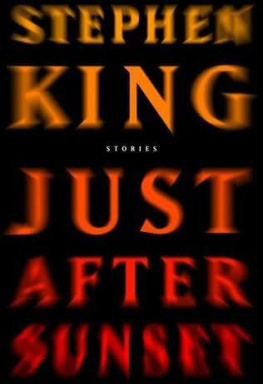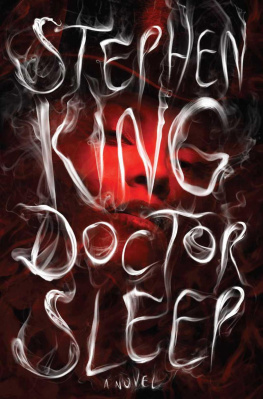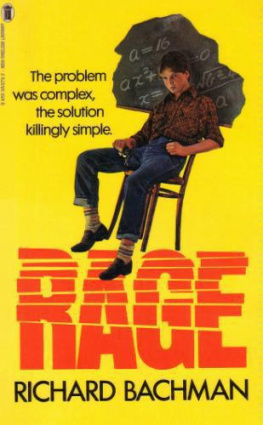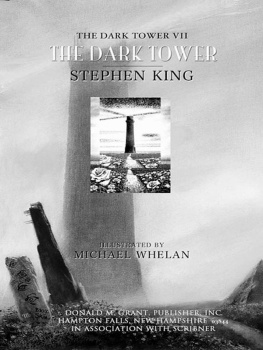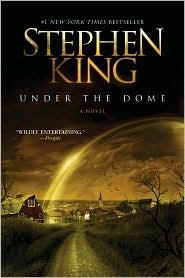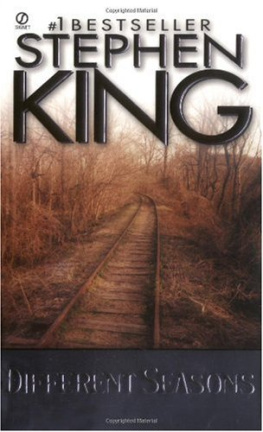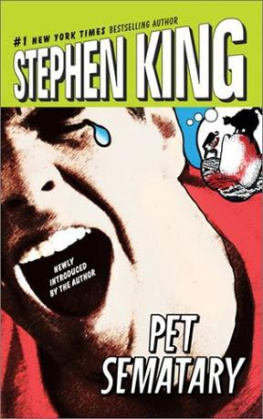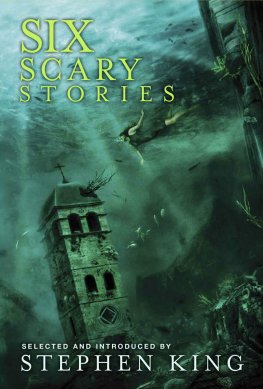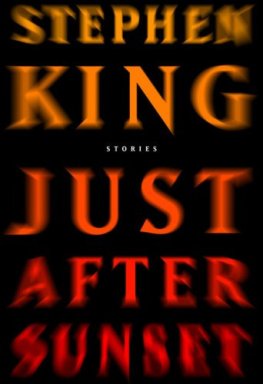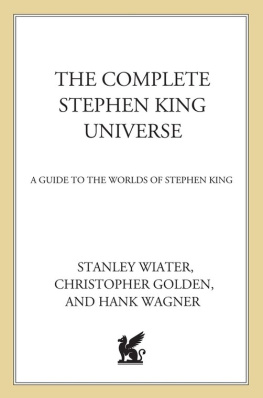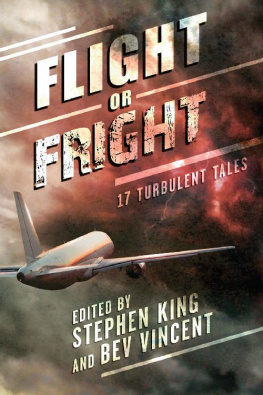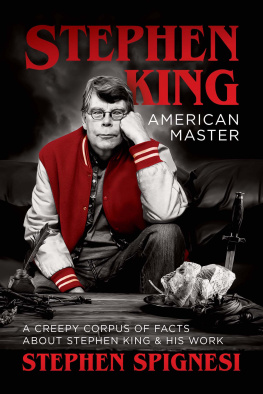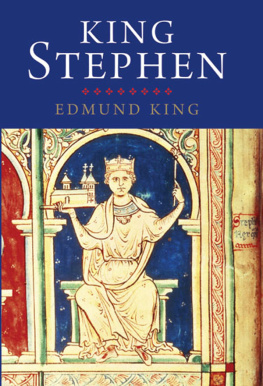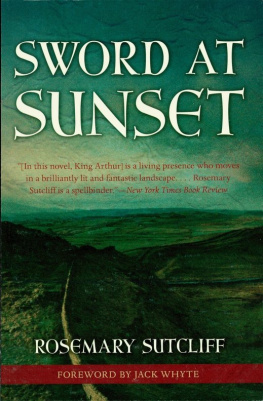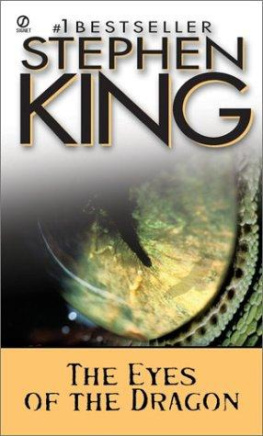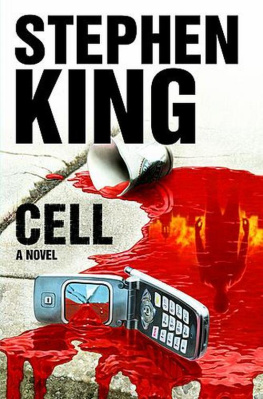Stephen King - Just After Sunset: Stories
Here you can read online Stephen King - Just After Sunset: Stories full text of the book (entire story) in english for free. Download pdf and epub, get meaning, cover and reviews about this ebook. year: 2008, publisher: Simon and Schuster, genre: Art. Description of the work, (preface) as well as reviews are available. Best literature library LitArk.com created for fans of good reading and offers a wide selection of genres:
Romance novel
Science fiction
Adventure
Detective
Science
History
Home and family
Prose
Art
Politics
Computer
Non-fiction
Religion
Business
Children
Humor
Choose a favorite category and find really read worthwhile books. Enjoy immersion in the world of imagination, feel the emotions of the characters or learn something new for yourself, make an fascinating discovery.
- Book:Just After Sunset: Stories
- Author:
- Publisher:Simon and Schuster
- Genre:
- Year:2008
- Rating:3 / 5
- Favourites:Add to favourites
- Your mark:
- 60
- 1
- 2
- 3
- 4
- 5
Just After Sunset: Stories: summary, description and annotation
We offer to read an annotation, description, summary or preface (depends on what the author of the book "Just After Sunset: Stories" wrote himself). If you haven't found the necessary information about the book — write in the comments, we will try to find it.
Just After Sunset: Stories — read online for free the complete book (whole text) full work
Below is the text of the book, divided by pages. System saving the place of the last page read, allows you to conveniently read the book "Just After Sunset: Stories" online for free, without having to search again every time where you left off. Put a bookmark, and you can go to the page where you finished reading at any time.
Font size:
Interval:
Bookmark:
For Heidi Pitlor
SCRIBNER
A Division of Simon & Schuster, Inc.
1230 Avenue of the Americas
New York, NY 10020
This book is a work of fiction. Names, characters, places, and incidents either are products of the authors imagination or are used fictitiously. Any resemblance to actual events or locales or persons, living or dead, is entirely coincidental.
Copyright 2008 by Stephen King
All rights reserved, including the right to reproduce this book or portions thereof in any form whatsoever. For information address Scribner Subsidiary Rights Department, 1230 Avenue of the Americas, New York, NY 10020.
SCRIBNER and design are registered trademarks of The Gale Group, Inc., used under license by Simon & Schuster, Inc., the publisher of this work.
Library of Congress Control Number: 2008013683
ISBN-13: 978-1-4391-2548-9
ISBN-10: 1-4391-2548-1
The following selections were previously published: Willa in Playboy ; The Gingerbread Girl in Esquire ; Harveys Dream in The New Yorker ; Rest Stop in Esquire ; Stationary Bike by Borderlands Press; The Things They Left Behind by Tor Books; Graduation Afternoon in Postscripts, no. 10; The Cat from Hell by Putnam; The New York Times at Special Bargain Rates in The Magazine of Fantasy & Science Fiction ; Mute in Playboy ; Ayana in The Paris Review ; A Very Tight Place in McSweeneys.
Visit us on the World Wide Web:
http://www.SimonSays.com
I can fancy what you saw. Yes; it is horrible enough; but after all, it is an old story, an old mystery played. Such forces cannot be named, cannot be spoken, cannot be imagined except under a veil and a symbol, a symbol to the most of us appearing a quaint, poetic fancy, to some a foolish tale. But you and I, at all events, have known something of the terror that may dwell in the secret place of life, manifested under human flesh; that which is without form taking to itself a form. Oh, Austin, how can it be? How is it that the very sunlight does not turn to blackness before this thing, the hard earth melt and boil beneath such a burden?
Arthur MachenThe Great God Pan
Introduction
One day in 1972, I came home from work and found my wife sitting at the kitchen table with a pair of gardening shears in front of her. She was smiling, which suggested I wasnt in too much trouble; on the other hand, she said she wanted my wallet. That didnt sound good.
Nevertheless, I handed it over. She rummaged out my Texaco gasoline credit cardsuch things were routinely sent to young marrieds thenand proceeded to cut it into three large pieces. When I protested that the card had been very handy, and we always made at least the minimum payment at the end of the month (sometimes more), she only shook her head and told me that the interest charges were more than our fragile household economy could bear.
Better to remove the temptation, she said. I already cut up mine.
And that was that. Neither of us carried a credit card for the next two years.
She was right to do it, smart to do it, because at the time we were in our early twenties and had two kids to take care of; financially, we were just keeping our heads above water. I was teaching high school English and working at an industrial laundry during the summer, washing motel sheets and occasionally driving a delivery truck around to those same motels. Tabby was taking care of the kids during her days, writing poems when they took their naps, and working a full shift at Dunkin Donuts after I came home from school. Our combined income was enough to pay the rent, buy groceries, and keep diapers on our infant son, but not enough to manage a phone; we let that go the way of the Texaco card. Too much temptation to call someone long distance. There was enough left over to occasionally buy booksneither of us could live without thoseand to pay for my bad habits (beer and cigarettes), but very little beyond that. Certainly there wasnt money to pay finance charges for the privilege of carrying that convenient but ultimately dangerous rectangle of plastic.
What left-over income we did have usually went for things like car repairs, doctor bills, or what Tabby and I called kidshit: toys, a second-hand playpen, a few of those maddening Richard Scarry books. And that little bit of extra often came from the short stories I was able to sell to mens magazines like Cavalier, Dude, and Adam . In those days it was never about writing literature, and any discussion of my fictions lasting value would have been as much a luxury as that Texaco card. The stories, when they sold (they didnt always), were simply a welcome bit of found money. I viewed them as a series of piatas I banged on, not with a stick but my imagination. Sometimes they broke and showered down a few hundred bucks. Other times, they didnt.
Luckily for meand believe me when I say that I have led an extremely lucky life, in more ways than this onemy work was also my joy. I was knocking myself out with most of those stories, having a blast. They came one after another, like the hits from the AM rock radio station that was always playing in the combination study-and-laundry-room where I wrote them.
I wrote them fast and hard, rarely looking back after the second rewrite, and it never crossed my mind to wonder where they were coming from, or how the structure of a good short story differed from the structure of a novel, or how one manages issues of character development, backstory, and time-frame. I was flying entirely by the seat of my pants, running on nothing but intuition and a kids self-confidence. All I cared about was that they were coming. That was all I had to care about. Certainly it never occurred to me that writing short stories is a fragile craft, one that can be forgotten if it isnt used almost constantly. It didnt feel fragile to me then. Most of those stories felt like bulldozers.
Many bestselling novelists in America dont write short stories. I doubt if its a money issue; financially successful writers dont need to think about that part of it. It might be that when the world of the full-time novelist shrinks to below, say, seventy thousand words, a kind of creative claustrophobia sets in. Or maybe its just that the knack of miniaturization gets lost along the way. There are lots of things in life that are like riding a bike, but writing short stories isnt one of them. You can forget how.
During the late eighties and nineties, I wrote fewer and fewer stories, and the ones I did write were longer and longer (and there are a couple of the longer ones in this book). That was okay. But there were also short stories I wasnt writing because I had some novel or other to finish, and that wasnt so okayI could feel those ideas in the back of my head crying to be written. Some eventually were; others, Im sad to say, died and blew away like dust.
Worst of all, there were stories I no longer knew how to write, and that was dismaying. I knew I could have written them in that laundry room, on Tabbys little Olivetti portable, but as a much older man, even with my craft more honed and my toolsthis Macintosh Im writing on tonight, for instancemuch more pricey, those stories were eluding me. I remember messing one up and thinking of an aging sword-maker, looking helplessly at a fine Toledo blade and musing, I used to know how to make this stuff .
Then one day three or four years ago, I got a letter from Katrina Kenison, who edited the annual Best American Short Stories series (she has since been succeeded by Heidi Pitlor, to whom the book you are holding is dedicated). Ms. Kenison asked if Id be interested in editing the 2006 volume. I didnt need to sleep on it, or even think it over on an afternoon walk. I said yes immediately. For all sorts of reasons, some even altruistic, but I would be a black liar indeed if I didnt admit self-interest played a part. I thought if I read enough short fiction, immersed myself in the best the American literary magazines had to offer, I might be able to recapture some of the effortlessness that had been slipping away. Not because I needed those checkssmall but very welcome when youre just starting outto buy a new muffler for a used car or a birthday present for my wife, but because I didnt see losing my ability to write short stories as a fair exchange for a walletload of credit cards.
Font size:
Interval:
Bookmark:
Similar books «Just After Sunset: Stories»
Look at similar books to Just After Sunset: Stories. We have selected literature similar in name and meaning in the hope of providing readers with more options to find new, interesting, not yet read works.
Discussion, reviews of the book Just After Sunset: Stories and just readers' own opinions. Leave your comments, write what you think about the work, its meaning or the main characters. Specify what exactly you liked and what you didn't like, and why you think so.

